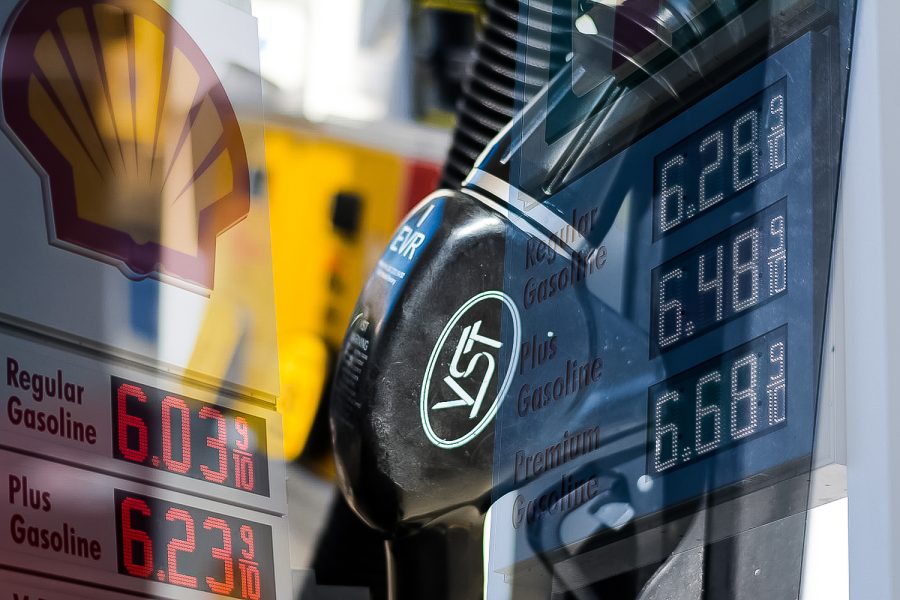High gas prices affect CSUN students
Photo Illustration: “Pumping Up” by Kaitlyn Lavo. Photos taken by Sam Landau.
May 17, 2022
Gas prices are reaching historical highs in the United States due to the pandemic, a decrease in oil production and U.S. sanctions on Russian oil. With this steep increase in prices, CSUN students are feeling the impact.
The average price of gas in Los Angeles County is $6.01 per gallon as of May 15, according to the American Automobile Association.
CSUN is largely a commuter school, with 49% of its students commuting to campus in individual cars, according to a 2018 commuting report conducted by CSUN’s Institute for Sustainability. With 29,763 students taking in-person classes this semester, more than 14,000 students may be affected by these prices.
Video by Habeba Mostafa
The commuting report found that CSUN students travel an average of 7.63 miles to campus and typically commute four days a week. This means that the average student drives 61.04 miles to and from campus each week.
In response to this, CSUN’s Associated Students announced that they were giving out $50 gas gift cards to the first 2,000 students who applied online. The application was set to close on May 6, but AS ran out of gift cards.
Ozzy Anguiano, a CSUN journalism major, drives a round trip of 184 miles between his parents’ house in Moreno Valley and campus three times a week. This commute, on top of his job as a pizza delivery driver, leads him to spend $200 a week on gas.
Anguiano sometimes skips class when he estimates the trip may cost him $40.
“My paycheck is only about $300 biweekly, so pretty much all of the money I make goes [to] gas,” Anguiano said. “If it weren’t for my savings, I’d be toast.”
Public transportation is not an option for Anguiano as he said it would take around 10 hours round trip. He feels frustrated that there seems to be no alternative.
“I remember getting pissed at this sign on the highway for Earth Day that said something like ‘Be green. Try public transportation,’” Anguiano said. “I was like ‘Gee, I wish it was an option you stupid sign!’”
Ricardo Barragan, a CSUN physics major, said that high gas prices are affecting his finances as well as his social life.
Before the spike in prices, Barragan used to spend $60 a week to fill his truck. He drops off his siblings at school five days a week and commutes to campus from Sylmar four days a week.
Now, his weekly gas expenses have jumped to $90. The closest gas station to Barragan used to be the cheapest, but that has changed.
“It used to be $4.50 [per gallon], then $4.80, then $5, the day after it was $5 it went up to $6,” Barragan said.
He is seeing his friends less due to gas being so expensive, which upsets him.
“It doesn’t feel right,” Barragan said. “[Living] day by day trying to figure out how to save money for gas.”
Barragan said he is considering taking other forms of transportation, such as the bus, but he would have to wake up much earlier.
The combination of gas prices, the pandemic and having to attend classes in person has also had an impact on geography major Jenna Irvin.
Irvin said that she spent less on gas during the height of the pandemic when school was taught online. Now that school is back in person, she commutes to CSUN four-to-five times a week from Santa Clarita. The drive to campus can take her anywhere from 15 minutes to an hour, depending on traffic.
She worked a full-time job when she was able to take classes remotely, but currently only has time to work part time. Rising gas prices and less work has left her in a much tighter financial situation.
Irvin hopes there will be more online options for classes soon because she does not feel safe taking public transportation due to COVID-19.
She feels like her social life has also taken a hit.
“I used to be willing to drive out to Thousand Oaks to see a certain movie. Now I wouldn’t do that,” Irvin said.
California lawmakers have proposed various gas rebates to help offset prices at the pump, but no concrete action has been taken.
